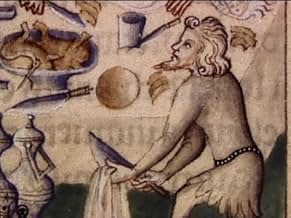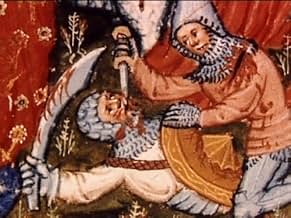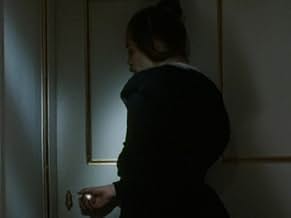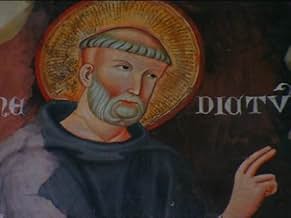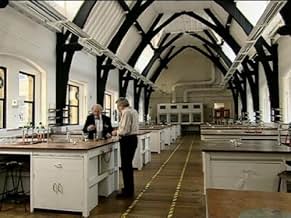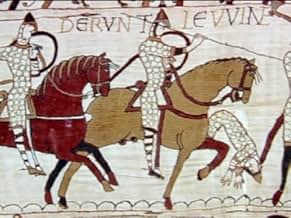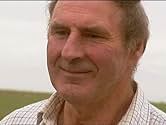Ajouter une intrigue dans votre langueTerry Jones hosts this series that looks at the real facts about the Middle Ages and its roots.Terry Jones hosts this series that looks at the real facts about the Middle Ages and its roots.Terry Jones hosts this series that looks at the real facts about the Middle Ages and its roots.
- Nommé pour 1 Primetime Emmy
- 1 nomination au total
Parcourir les épisodes
Avis à la une
Terry Jones, tells the public how the myths really were. That Robin H. wasn't as nice as he seemed to be, and that history is really told by the winner.
He has taken the python-esquire way of display, and it works out great. The graphics the humor and the sometimes very detailed look at things that happened.
Every program consists of one subject which will be analyzed and put against the way of life today.... No, not much change if you watch carefully.
If you are interested in history, but you don't want to be lectured, than this is a series for you!
Would be great BTW, if Terry Jones took a look at the rest of Europe/the world this way :)
He has taken the python-esquire way of display, and it works out great. The graphics the humor and the sometimes very detailed look at things that happened.
Every program consists of one subject which will be analyzed and put against the way of life today.... No, not much change if you watch carefully.
If you are interested in history, but you don't want to be lectured, than this is a series for you!
Would be great BTW, if Terry Jones took a look at the rest of Europe/the world this way :)
As a history teacher, I will heartily agree that too often our history is learned in such a dry and awful way that it's no wonder kids often say they hate the subject. In addition, people assume that nothing interesting or important happened during the Medieval period--like everyone just sat around waiting to die (at about age 7). That's how I was taught the subject by my teachers. Thank goodness for a television series like MEDIEVAL LIVES, as it injects humor into the topic and is told in a fascinating manner--and infuses the viewer with a sense that the "Dark Ages" weren't quite so dark.
Terry Jones (of Monty Python fame) narrates this series and since there were no videos made during the time, knights, monks, serfs and the like are portrayed by animating them in a way reminiscent of Terry Gilliam (the guy who made the cartoons for Monty Python). And, given our newer technology, in many cases Jones himself is able to walk through these paintings and interact with the characters! Additionally, he travels throughout Europe to illustrate the locales talked about in the shows--which talk about such topics as the monk, the knight, minstrels, and peasants.
I have copied these shows when they came on television and given them out to my students to watch. These students who previously thought this time period was dull came back energized--laughing at Jones' antics and realizing how important and interesting history can be when properly taught! A must for anyone.
Terry Jones (of Monty Python fame) narrates this series and since there were no videos made during the time, knights, monks, serfs and the like are portrayed by animating them in a way reminiscent of Terry Gilliam (the guy who made the cartoons for Monty Python). And, given our newer technology, in many cases Jones himself is able to walk through these paintings and interact with the characters! Additionally, he travels throughout Europe to illustrate the locales talked about in the shows--which talk about such topics as the monk, the knight, minstrels, and peasants.
I have copied these shows when they came on television and given them out to my students to watch. These students who previously thought this time period was dull came back energized--laughing at Jones' antics and realizing how important and interesting history can be when properly taught! A must for anyone.
Peasant's revolt 1381 is also called Wat Tyler's Rebellion turns out to be more complex than first thought. An excellent view of medieval lives presented by Terry Jones is not a bunch of sound bites and redundant information from obscure experts. They get right down to the bone. The 1349 Black Death plague is also spotted.
Then there is the monk. We learn the truth about monkhood. Most of the monks look like Terry Jones. We see that prayers became a commodity. We learn about bare bottom piety. There is a competition to have the best relics. There was the 1327 rebellion against a monastery; it was a preliminary to 1381.
Now consider the Damsel. It also looks like Terry Jones. The archetype of the passive female. Nicola de la Haye pushing 70; she was aided by William Marshal. We get the real story with the use of puppets to keep this PG13. We have stories of women abducting men. We follow women's fashion. 1429 Joan of Arc story is told; her real crime was that she wore men's clothing.
Would you believe the Minstrel? In 1066 At the Battle of Hastings, Taillefer recited the Chanson de Roland to the Norman troops while juggling with his sword. They tell of troubadours that tell stories in the vernacular. He mentions Geoffrey Chaucer who mysteriously disappears; dispatching is suspected.
A knight to remember. William Marshal returns as the subject in an interesting story of his life and how he became a knight. We see them train horses to kick shields. We learn about the order of the garter founded in 1348.
Shall we consider the philosopher? A medieval scientist and possibly doctor. We get a look at a field where they grew all the herbs needed for medicine. We get pictures of experiments with newer medicines. We even found anesthetics. We find Washington Irving is responsible for making us think that they thought the world is flat. Nobody ever thought the world is flat. We also get to see an astronomical clock. All to display our ignorance of our own past.
Stand and deliver. Not midwives but the outlaw. Terry asks "Did outlaws never wear trousers?" We learn about "The Folvilles" (John De Folville 1312 - 1363 and his sons.) Among other gangs. 1150 trial by jury, but not as we know it. We get to see unique ways of execution and/or mutilation. We learn that outlaws are part of the heart of what makes England.
Midlevel kings divided into the good, the bad, and the ugly. We cover three Richards. We get a spot of Richard the third form Shakespeare. He tells of the King of England that on one has ever heard of.
Then there is the monk. We learn the truth about monkhood. Most of the monks look like Terry Jones. We see that prayers became a commodity. We learn about bare bottom piety. There is a competition to have the best relics. There was the 1327 rebellion against a monastery; it was a preliminary to 1381.
Now consider the Damsel. It also looks like Terry Jones. The archetype of the passive female. Nicola de la Haye pushing 70; she was aided by William Marshal. We get the real story with the use of puppets to keep this PG13. We have stories of women abducting men. We follow women's fashion. 1429 Joan of Arc story is told; her real crime was that she wore men's clothing.
Would you believe the Minstrel? In 1066 At the Battle of Hastings, Taillefer recited the Chanson de Roland to the Norman troops while juggling with his sword. They tell of troubadours that tell stories in the vernacular. He mentions Geoffrey Chaucer who mysteriously disappears; dispatching is suspected.
A knight to remember. William Marshal returns as the subject in an interesting story of his life and how he became a knight. We see them train horses to kick shields. We learn about the order of the garter founded in 1348.
Shall we consider the philosopher? A medieval scientist and possibly doctor. We get a look at a field where they grew all the herbs needed for medicine. We get pictures of experiments with newer medicines. We even found anesthetics. We find Washington Irving is responsible for making us think that they thought the world is flat. Nobody ever thought the world is flat. We also get to see an astronomical clock. All to display our ignorance of our own past.
Stand and deliver. Not midwives but the outlaw. Terry asks "Did outlaws never wear trousers?" We learn about "The Folvilles" (John De Folville 1312 - 1363 and his sons.) Among other gangs. 1150 trial by jury, but not as we know it. We get to see unique ways of execution and/or mutilation. We learn that outlaws are part of the heart of what makes England.
Midlevel kings divided into the good, the bad, and the ugly. We cover three Richards. We get a spot of Richard the third form Shakespeare. He tells of the King of England that on one has ever heard of.
I was a little put off by the other commenter when they spoke of the playful nature of this series because I generally prefer my facts to be undiluted. Unfortunately comedic documentaries tend to blur the line between fact and fiction to the point where the more extreme facts seem doubtful and certainly wouldn't hold up in conversation.
However, this series does a fantastic job of keeping the subject light hearted while still being dense with facts. The general structure of each episode is a brief introduction to the "stereotype" and then the rest of the episode focuses on deconstructing that stereotype, sometimes even showing where the misconception came from.
However, this series does a fantastic job of keeping the subject light hearted while still being dense with facts. The general structure of each episode is a brief introduction to the "stereotype" and then the rest of the episode focuses on deconstructing that stereotype, sometimes even showing where the misconception came from.
While the host, Terry Jones is most popularly known for his role(s) as part of the Monty Python gang, he also wears the high-brow hats of author and historian. He has been involved in producing both video and written works covering the lives, struggles and daily work (for example the series "Worst Jobs in History") of people through the ages, ancient and historical inventions (the series aptly titled *Ancient Inventions"), the history of mathematics/numbers (documentary: "The Story of 1"), and more. His numerous published works include several non-fiction histories, children's books and an in-depth speculative look into the mysterious disappearance of the famous Chaucer ("Who killed Chaucer? A real life Medieval Murder Mystery" NF). While not an "academic", Terry Jones definitely exhibits a love and knowledge of history, and obviously believes that education doesn't have to be dull. I have found all of his works to accurately reflect prevailing opinions about his subjects for the time of production.
You can be sure that Jone's videos are highly entertaining, educational and informative while steeped in G-rated humor (with perhaps some sly innuendo, which will quietly fly right over most youngsters' heads). Terry Jones is well-known for dressing in drag as part of his Monty Python skits, and there is no shortage of cross-dressing in his historical videos, to great effect. He's a wonderful sport about steeping himself quite literally into the lives of his historical subjects (hilarious and sometimes "awfully funny"--emphasis on "awfully" in "Worst Jobs in History"), which makes his presentations original, funny and humanizing. It's too easy to forget that our ancestors were all people just like us. Terry Jones has a wonderful way of bringing history warmly, respectfully, richly alive for all ages.
My only criticism is that I felt the segments were too short for each time period (which is more of a problem of the nature of the medium and not a question of quality). Both BBCand PBS often direct viewers to alternative sources for more information (both of which have aired these shows--and if I remember right, one or the other sponsored these productions).
You can be sure that Jone's videos are highly entertaining, educational and informative while steeped in G-rated humor (with perhaps some sly innuendo, which will quietly fly right over most youngsters' heads). Terry Jones is well-known for dressing in drag as part of his Monty Python skits, and there is no shortage of cross-dressing in his historical videos, to great effect. He's a wonderful sport about steeping himself quite literally into the lives of his historical subjects (hilarious and sometimes "awfully funny"--emphasis on "awfully" in "Worst Jobs in History"), which makes his presentations original, funny and humanizing. It's too easy to forget that our ancestors were all people just like us. Terry Jones has a wonderful way of bringing history warmly, respectfully, richly alive for all ages.
My only criticism is that I felt the segments were too short for each time period (which is more of a problem of the nature of the medium and not a question of quality). Both BBCand PBS often direct viewers to alternative sources for more information (both of which have aired these shows--and if I remember right, one or the other sponsored these productions).
Meilleurs choix
Connectez-vous pour évaluer et suivre la liste de favoris afin de recevoir des recommandations personnalisées
Détails
- Date de sortie
- Pays d’origine
- Langue
- Aussi connu sous le nom de
- Terry Jones' Medieval Lives
- Lieux de tournage
- City of London, Angleterre, Royaume-Uni(on location)
- Sociétés de production
- Voir plus de crédits d'entreprise sur IMDbPro
Contribuer à cette page
Suggérer une modification ou ajouter du contenu manquant

